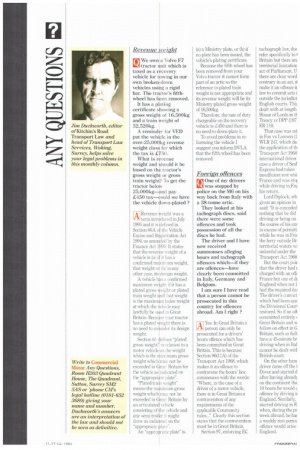Revenue weight
Page 51

If you've noticed an error in this article please click here to report it so we can fix it.
We own a Volvo F7 tractor unit which is taxed as a recovery vehicle for towing in our own broken-down vehicles using a rigid bar. The tractor's fifthwheel has been removed.
It has a plating certificate showing a gross weight of 16,500kg and a train weight of 32,520kg.
A reminder for VED put the vehicle in the over-25,000kg revenue weight class for which the tax is £750.
What is revenue weight and should it be based on the tractor's gross weight or gross train weight? To get the tractor below 25,000kg—and pay Z450 tax—could we have the vehicle down-plated ?
ARevenue weight was a term introduced in July 1995 and it is defined in Section 60A of the Vehicle Excise and Registration Act 1994. as amended by the Finance Act 1995. It states that the revenue weight of a vehicle is (a) if it has a confirmed maxirriim weight, that weight or in any other case, itsidesign weight A vehicle Nis a confirmed maximum weight if it has a plated gross Veight or plated train weight and -hat weight is the maximum laden weight at which the vehicle may lawfully be used in Great Britain. Because Your tractor has a plated weight there is no need to considir its design weight,
Section 61 delin,Is "plated gross weight' in relation to a motor vehicle;asihe weight which is the Maximum gross weight which Imay not be exceeded in Great Britain for the vehicle asindicated on the "appropriate plate".
"Plated train weight" means the maximum gross weight whichdna v not be exceeded in Great Britain by an articulated vehicle consisting of the vehicle and any semi-traiter it might draw as indicined on the "appropriate plate-.
An "approiiiiate plate" is (a) a Ministry plate, or (b) if no plate has been issued, the vehicle's plating certificate.
Because the fifth wheel has been removed from your Volvo tractor it cannot form part of an artic so the reference to plated train weight is not appropriate and its revenue weight will be its Ministry plated gross weight of 16,500kg.
Therefore, the rate of duty chargeable on the recovery vehicle is ,E450 and there is no need to down-plate it.
Jo avoid problems in relicensing the vehicle 1 suggest you inform DVLA that the fifth-wheel has been removed.
Foreign offences
One of my drivers was stopped by police on the 141.6 on his way back from Italy with a 38-tonne artic.
They looked at his tachograph discs, said there were some offences and took possession of all the discs he had_ The driver and I have now received summonses alleging hours and tachograph offences which—if they are offences—have clearly been committed in Italy. Germany and Belgium.
I am sure I have read that a person cannot be prosecuted in this country for offences abroad. Am I right ?
FiCI Yes. In Great Britain a [4:N person can only be prosecuted for a drivers' hours offence which has been committed in Great Britain. This is because Section 96(11A) of the Transport Act 1968, which makes it an offence to contravene the hours' law, commences with the words: "Where, in the case of a driver of a motor vehicle, there is in Great Britain a contravention of any requirements of the applicable Community rules..." Clearly this section states that the contravention must be in Great Britain.
Section 97, enforcing EC
tachograph law, doe refer specifically to I Britain but there an ten-itorial limitation act of Parliament. U there are clear word contrary in an act, i1 make it an offence it law to commit acts i outside the jurisdict English courts.Thh dealt with at length House of Lords in ti Treacy vs DPP (197: ER 110.
That case was ref in Fox vs Lawson (1 WU 247, which de; the application of th Transport Act 1968 international driver. case a driver of Seat Express had taken insufficient rest whi France and was stoi while driving in Ern his return.
Lord Diplock, wh given an opinion in said: "It is conceded nothing that he did driving or being on the course of his eni in excess of permitt while he was in Fra: the ferry outside Br territorial waters w; unlawful under the Transport Act 1968 But the court poi] that the driver had charged with an offt France but one of di England when not I had the required dai The driver's convict which had been qu2 the Divisional Court restored. So if an off committed entirely Great Britain and w follow-on effect in G Britain, such as faili have a 45-minute hr driving when in Ital cannot be dealt witt British court.
On the other ham driver came off the I Dover and started d after having alreacl on the continent tha 10 hours he would offence by driving ii England. Similarly, started driving in E when, during the pr week abroad, he hac a weekly rest perioc offence would arise England.




























































































































